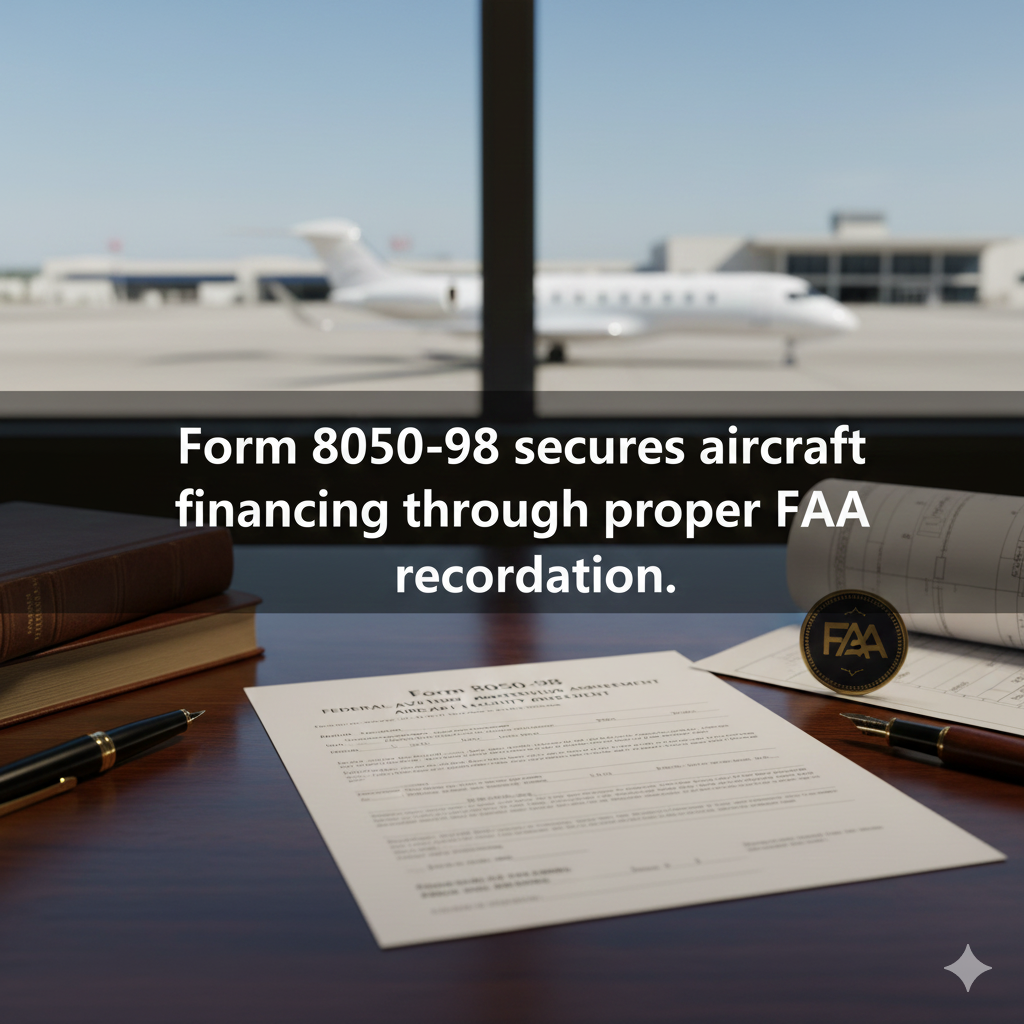Form 8050-98 is the legal instrument that establishes and protects a lender’s interest in the collateral, ensuring that their claim is properly recorded at the national level.
We recognize that navigating federal regulations can be complex. Our mission at the National Aviation Center is to provide the clarity and expertise needed to successfully record all necessary documents with the FAA.

Why Recording the Aircraft Security Agreement is Essential
A security interest on an aircraft must be publicly recorded to be effective against third parties. Accordingly, federal law requires all aircraft, engines, propellers, and associated parts to be recorded with the FAA Registry.
Through this system, a uniform national repository is created, providing protection and clarity in aviation transactions.
As a result, filing this document guarantees that the secured party’s interest is perfected under federal statute. However, without FAA recordation, a security agreement is only valid between borrower and lender, exposing the secured party to outside claims.
Furthermore, potential buyers or subsequent creditors who check the public record—known as procuring an aircraft abstract of title—would have no notice of the outstanding lien, meaning their interests could take priority over an unrecorded claim.
Therefore, recordation is not optional; it is the foundation of secure aircraft financing.
The Federal Standard for Protection
The requirement to federally record security interests serves several vital functions across the aviation industry.
- Establishing Priority: The date and time of the FAA’s receipt of the properly executed document is the timestamp that determines the priority of competing claims.
- Public Notice: It provides legally recognized constructive notice to the entire world that a security interest exists against the identified property.
- Facilitating Title Searches: It simplifies the due diligence process for lenders and purchasers, allowing them to confirm the financial status of an aircraft before completing a transaction.
- Ensuring Compliance: It adheres to the framework established by federal statutes regarding the creation and perfection of property interests in civil aircraft.
Who Must Prepare and Submit the Form 8050-98?
The lender ultimately ensures Form 8050-98 is correctly drafted, executed, and filed to protect their investment.
When a financial institution extends credit to an owner for the purchase of an aircraft, or when refinancing a current debt, the creation of an aircraft mortgage (or security agreement) is required. The document itself is structured to formalize the debt and the collateral securing it.
Distinguishing Between Parties
We help both debtors and secured parties ensure all documents meet the strict FAA criteria.
| Party Role | Legal Position | Signature Requirement |
| Debtor/Grantor | The owner of the aircraft who is granting the security interest (the borrower). | Must execute (sign in ink) the agreement, certifying they are the owner of record. |
| Secured Party/Grantee | The entity or person receiving the security interest (the lender). | While typically the submitter, their signature is generally required for subsequent assignments or releases of the security interest. |
The most common reasons this form is required include:
- Securing a loan for the initial purchase of an aircraft.
- Recording a refinancing agreement on an existing aircraft.
- Perfecting an interest in collateral such as eligible engines or propellers that are not permanently attached to an aircraft.
- Recording assignments of security interests from one lender to another.
Our role is to review the document submitted to us, checking every field for compliance, ensuring the signatures are valid, and confirming the aircraft and parties are correctly identified according to FAA standards before we send it for recordation.
A Step-by-Step Guide: How to Fill Out Form 8050-98
Filling out the Aircraft Security Agreement correctly is essential for timely recordation. The FAA Registry maintains very high standards for document acceptance, and a single missing piece of information or an incorrect signature can lead to document rejection and loss of priority. We guide our clients through every section of this document, ensuring accuracy from start to finish.
The document must clearly establish the security interest, identify the collateral, and include proper execution details. When submitting this form, it must be accompanied by the prescribed fee.
Remember: the FAA registration of the aircraft must be current for the form to be recorded.
Required Collateral Information
The most critical information requested on Form 8050-98 relates directly to the property that serves as collateral. Our service ensures that the identification is unambiguous and matches the official records. This typically includes:
- Aircraft:
- FAA Registration Number (N-Number).
- Manufacturer’s name.
- Model Designation.
- Manufacturer’s Serial Number (MSN).
- Engines/Propellers/Parts Location (if applicable):
- Detailed description including manufacturer, model, and serial number.
- For spare parts, the specific location must be designated.
The rule in 14 CFR part 47, specifically 14 CFR §47.47, details the required characteristics for any document to be eligible for recordation, noting the necessity of a notarized signature only if the law of the place of execution requires it.
We make sure that all requirements are met based on the specific jurisdiction of the signing party. Our service understands that every detail matters, including the proper dating and application of titles for corporate entities. If the debtor is a corporation or partnership, the person signing must clearly indicate their title and authority to sign on behalf of the entity.
Understanding the Severe Risks of Non-Compliance
Failing to properly or timely record your Aircraft Security Agreement carries significant legal and financial risks for the secured party. Because federal law preempts state law regarding the perfection of security interests in aircraft, failure to record with the FAA means the lender’s interest is, in a legal sense, unperfected and unprotected against third-party claims.
If the security interest is not recorded, the lender is effectively unsecured. Should the debtor default on the loan, or if the aircraft is sold, seized, or subject to bankruptcy proceedings, the secured party could lose their legal claim to the collateral entirely. This is a crucial distinction in aviation finance, which is why we emphasize immediate and accurate filing.
Protecting Your Investment from Legal Vulnerability
The most damaging consequences of an unrecorded security interest are realized in these scenarios:
- Bankruptcy Proceedings: In a Chapter 11 or Chapter 7 bankruptcy filing, an unrecorded security interest may be treated as an unsecured claim, meaning the lender would stand in line with general creditors and likely recover only a fraction of the debt, or nothing at all.
- Subsequent Purchasers: If the debtor attempts a plane exchange of ownership, a new purchaser who performs a title search and finds no recorded lien may be deemed a “buyer in the ordinary course of business.” In many jurisdictions, such a purchaser takes the aircraft free and clear of the unrecorded security interest.
- Competing Creditors: If the debtor grants a second security interest to a different lender and that second lender records their interest first, the second lender will have priority over the initial, unrecorded security interest, even if the first loan was executed earlier. The FAA operates on a “first to file” system.
To mitigate these risks, we ensure that the moment we receive your correctly executed documents, they are submitted to the FAA Registry for recordation, locking in your priority date and time. This immediate action is the only defense against legal subordination.
Beyond the Form: Other Important Recording Requirements
While Form 8050-98 is central to securing financing, the National Aviation Center assists clients with a full spectrum of other essential FAA Registry filings necessary to maintain legal compliance and clear ownership records.
The FAA Registry is the definitive source for determining legal ownership and encumbrances, requiring various conveyances and notices to be recorded throughout the life of the aircraft.
For instance, proper documentation is required for any owner who changes their mailing address. We frequently assist clients with submitting an aircraft change of address notification to ensure official FAA communication, such as plane registration renewals and airworthiness directives, continues to reach the proper owner.
Federal regulations require prompt notification to the Registry, and we streamline this administrative process to ensure continuous compliance.

How National Aviation Center Simplifies the Recording Process
Filing documents with the FAA Registry involves bureaucracy and rigid requirements, often causing high rejection rates. As a result, many individuals and inexperienced parties struggle to complete the process correctly.
In response to these challenges, at the National Aviation Center, our service is designed to eliminate this stress and uncertainty. Accordingly, we act as your specialized intermediary, leveraging our extensive knowledge of the FAA’s procedures, forms, and legal requirements to ensure swift and successful recordation.
Moreover, we offer a comprehensive suite of services that goes beyond simple document submission. In addition, our team understands filing requirements, evidence of ownership, fees, and notarization, allowing you to focus on your venture.
Finally, our internal systems are optimized for speed and accuracy, reducing rejection risk and securing your filing quickly.
Focused on Accuracy and Timeliness
Our value proposition is centered on three core principles:
- Pre-Filing Audit: Before submission, every document you send to us, including your completed Form 8050-98, undergoes a meticulous audit by our team of experts. We check for common errors, such as missing collateral descriptions, unsigned or improperly dated forms, and discrepancies between the security agreement and other recorded title documents. This process drastically reduces the likelihood of the FAA returning the document for correction.
- Expedited Submission: We know that time is critical when establishing lien priority. Once a document passes our internal review, we immediately prepare it for submission to the FAA Registry. Our established process ensures your documents are physically delivered and accepted for processing in the fastest manner possible.
By utilizing our expertise, you are not simply hiring a submission service; you are investing in the peace of mind that comes with knowing your critical security interest is perfected correctly, protecting your collateral and safeguarding your investment.
Maintaining Clear Records for Future Transactions
The long-term value of your aircraft depends on the integrity and clarity of its FAA title file.. A clean record facilitates future sales, refinancings, and major operational changes. Conversely, a title file that contains unreleased liens, outdated addresses, or improperly recorded conveyances can drastically slow down or even jeopardize a future plane sale.
Our focus on detail and regulatory adherence ensures filings are completed correctly the first time, preventing future complications. By using our services, you build a consistent history of clear documentation for all major transactions.
Meticulous record keeping becomes an invaluable asset when you choose to divest or restructure ownership. We remain committed to supporting every stage of your aircraft’s legal journey.



